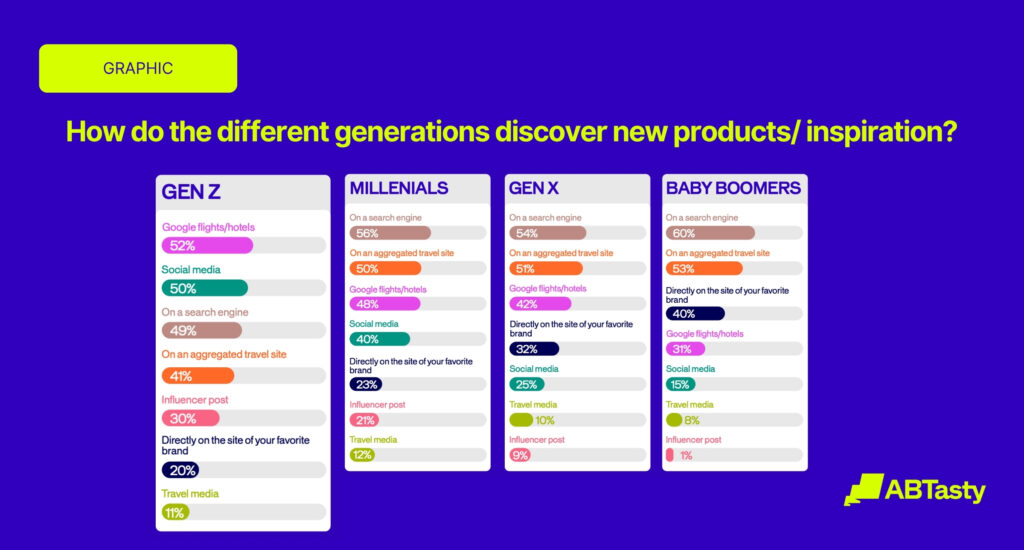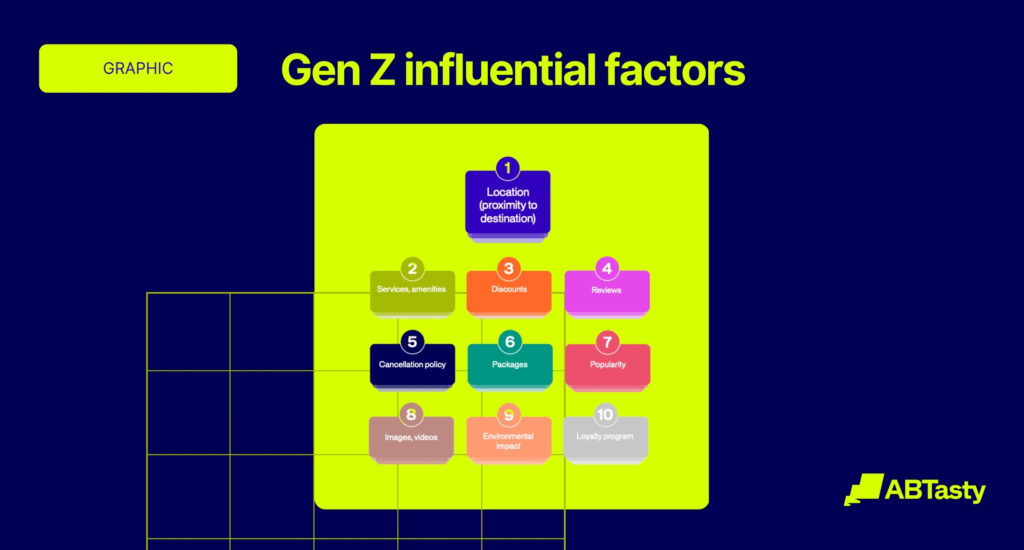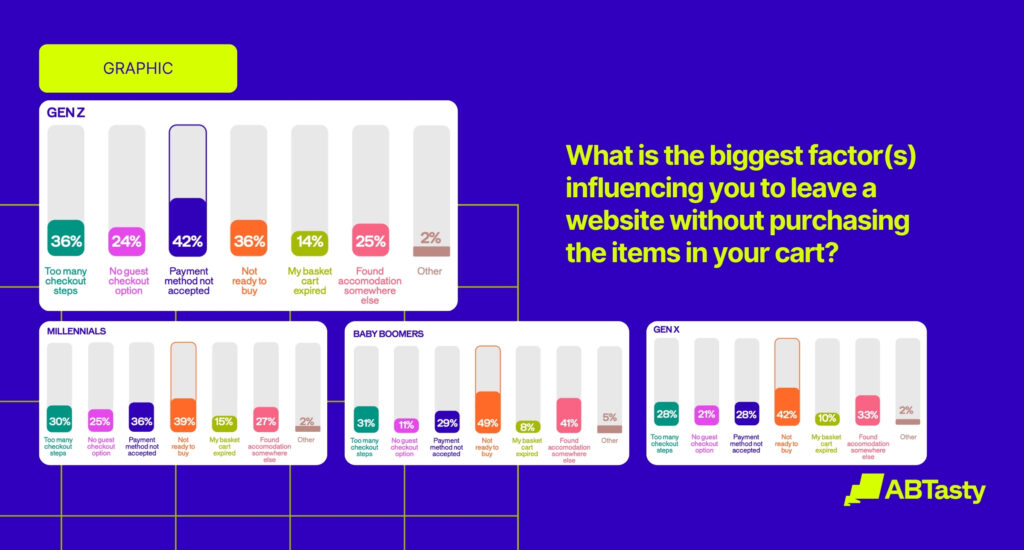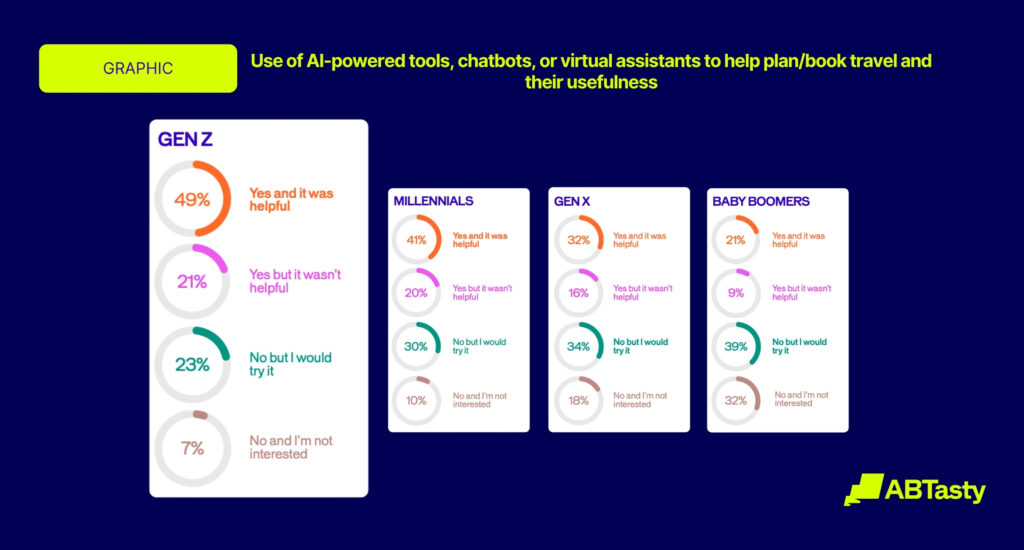Travel and hospitality is a huge industry, estimated at 955.90 billion USD in 2025. It’s also one that’s changing rapidly, with online travel bookings projected to account for 75% of all revenue by 2029. That’s why we’ve put together industry insights in our e-book, Decoding Online Shopping: Travel and Hospitality Consumer Trends for 2025.
What’s clear from our research is that Gen Z is quickly reshaping the online travel journey. They’re doing things differently to previous generations, from where they find inspiration, to why they abandon a cart, and how they view personalization. And that has big implications for travel brands.
Google flights/hotels and social media are now their go-to
A majority of Gen Z say they now start their search for travel options on Google Flights/Hotels (52%) or social media (50%). This shows a major shift from all other generations, who prefer to start their online search on a search engine or an aggregated travel site like Booking.com.
These results indicate that social media will, if anything, be an even more crucial battleground for travel brands going forward. To grab Gen Z’s attention, you’ll need to budget for targeted social media ads. Influencer content also plays an important role here, not only in making Gen Z aware of potential travel options but in providing social proof of existing ones.

Location still leads, but reviews and visuals are more important
One thing that hasn’t changed for Gen Z when booking accommodation and transportation options online is the importance of location. Proximity to key destinations is still the most influential factor in convincing Gen Z to book, as it is with other generations.
What does change for Gen Z is their even greater reliance on authentic reviews. They want their travel choices to be validated by their peers, and well-positioned authentic reviews provide them with the reassurance they need to feel confident in their decision. Use A/B testing to determine the ideal placement of customer reviews on the relevant pages of your website.
Growing up with digital technology and social media, Gen Z also thrives on visual content. Having visually engaging, up-to-date images and videos on your website will appeal to them more than any other generation. This also holds true for hotel listings on Google Hotels and aggregated travel sites.

Simplify checkout and increase payment options
The number one reason that Gen Z leaves a travel website without making a purchase is that their chosen payment method is not accepted. This again is in sharp contrast to previous generations, where the top reason for doing so is that they simply aren’t ready to buy. However, that does suggest that if Gen Z gets to your website, they’ll be more ready to buy. Adding additional payment methods, like Apple Pay or Google Pay, will reduce the chances of Gen Z leaving before they’ve booked.
Gen Z also say they leave a website if there are too many steps involved in checkout. Adjusting the checkout process to make it more streamlined will reduce unnecessary friction and increase the likelihood of Gen Z making a purchase.

Adapt with personalization and AI
Above all, Gen Z wants a seamless digital experience that’s tailored to their needs. And 65% of Gen Z embrace data-driven personalization as a helpful tool. Once again, this is a higher number than generations before them. Specifically, Gen Z wants a website to remember their preferences and offer them real-time recommendations based on those preferences.
Personalization gives you a perfect opportunity to build stronger relationships with Gen Z customers. You can do this by leveraging first-party data to offer tailored recommendations, simplify the booking process, and provide faster checkout.
Gen Z are also more open than any previous generation to using AI-powered tools, like chatbots or virtual assistants. Nearly half of Gen Z (49%) say they’ve used an AI tool when booking travel options and found it helpful. And just 7% of Gen Z say they’re not interested in AI at all.
Focus on making AI interactions feel natural, efficient and genuinely helpful. Set clear expectations about what AI can and can’t do, and ensure human support is easily accessible if needed.

Examples of personalization done right
While there’s no one-size-fits-all when it comes to personalization, some companies seem to do personalization consistently well:
- Netflix uses personalization to determine customers’ interests and promote related content and suggestions in real time. This is a perfect example of how personalization can remove friction by making it easier for customers to find what they’re looking for.
- Stitch Fix collects information customers supply about their size, shape, and personal style. It then selects outfits based on each one’s taste and personality. This shows how personalization and AI can work together to offer customers a great website experience.
- LinkedIn is a great example of a company that knows how to balance privacy concerns with utility. By providing personalized suggestions and links based on users’ current connections, LinkedIn makes it easier to network, look for work, or catch up with former co-workers.
Conclusion
The travel and hospitality industry is rapidly evolving, and Gen Z are quickly reshaping what the online travel journey looks like. Their expectations of what makes a good digital experience are also greater than ever before. To be successful, this needs to be seamless and tailored to their needs.
Key to this is greater personalization powered by data and experimentation. By optimizing Gen Z’s experience of booking travel options, you can build trust and loyalty and keep Gen Z travelers coming back for more.
Takeaways for travel and hospitality brands
- Work on your social media presence to influence potential customers and increase brand awareness.
- Showcase nearby attractions and must-see sites in listings to capture attention.
- Feature high-quality reviews and images on key pages to build trust and credibility.
- Simplify checkout and offer more payment options to reduce drop off.
- Personalize with relevant real-time recommendations for a more tailored digital experience.
- Use AI to provide instant answers and assist travelers in real time.







